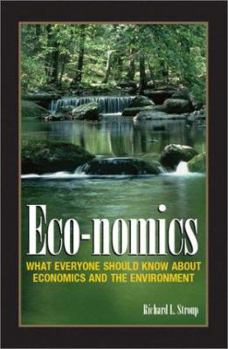Eco-nomics: What Everyone Should Know about Economics and the Environment
Select Format
Select Condition 
Book Overview
It's one thing to be passionate about protecting the environment. It's another to be successful at it. In this book, Stroup expains why many of our environmental laws have failed us and how we might... This description may be from another edition of this product.
Format:Paperback
Language:English
ISBN:1930865449
ISBN13:9781930865440
Release Date:March 2003
Publisher:Cato Institute
Length:91 Pages
Weight:0.40 lbs.
Dimensions:0.3" x 6.0" x 9.0"
Customer Reviews
4 ratings
Eco-nomics : What Everyone Should Know About Economics and the Enviroment
Published by Thriftbooks.com User , 18 years ago
~Eco-nomics : What Everyone Should Know About Economics and the Enviroment~ adroitly illustrates the vitality of market processes and private property rights while making it clear that the market is not incompatible with civil society's desire to protect the environment. Far from being detrimental to the environment, a liberal market economy, particularly over time, serves our societal goal of environmental protection. Private property encourages good stewardship and accountability, and making more "commons" is not necessarily advantageous to cause of environmental protection by any means. Many laws have been enacted to preserve scenic natural beauty and prevent pollution, but such regulations often have unintended consequences. Richard Stroup opens with a straightforward introduction to economics and the problems posed such as scarcity, and the upside and downside to competition. Stroup astutely explains how free market exchange is conducive to a prosperous society. Stroup incisively explains the consequences of strict environmental protection or "protection at any cost" measures. They are quite a few ridiculous cases where overbearing regulators trample property rights and extort exorbitant sums of money from property owners-in the name of environmental protection. Stroup clearly ascertains why public policies that erode the protection of property rights actually serve to reduce the ability and incentive of owners to protect and conserve their resources. With innovate public policy solutions, however, society can set and attain reasonable environmental protection goals while not biting the hand that feeds it. Pollution credit charges and a trading system to exchange those credits have served well. He concludes that the burden of proof for a regulatory intrusion should be on the government, not on the private property owner. Nonetheless, Stroup surmises in the end that market solutions prove more effective than mindless intervention.
Good, But One Sided
Published by Thriftbooks.com User , 19 years ago
This book is NOT about economics and the environment. It IS about the up-side of using property rights and free-market capitalism to resolve conflicts with environmental regulation. The book (actually a very long essay) is very well written, but it only presents one side of this debate; nothing wrong with that, everyone does it, but in this case it should be more clearly stated. For every example of where property rights and free-market environmentalism have worked, there are examples of where they didn't. PERC is not in the business however of presenting both sides, again; nothing wrong with that. However if you are looking for a book about the general considerations of economics and the environment, Try Bionomics: Economy As Ecosystem by Michael Rothschild or For the Common Good : Redirecting the Economy toward Community, the Environment, and a Sustainable Future by Herman E. Daly. While both of these may be as biased to the other side of the issue, although I'm not sure what "the other side" is, they are much more about the use of economic theory to understand conflict resolution in environmental disputes.
Very Interesting!
Published by Thriftbooks.com User , 20 years ago
Most people don't think economics is very interesting. In fact, they tend to think of economics as dry and boring. Professor Stroup has written a book that should reverse that thinking. He has taken his analytical skills as an economist and shown how the basic principles of that discipline are imperialistically invasive; that is, they can easily be applied to a broad range of topics, including the environment. If you want to understand why some people, especially many economists, consider environmentalists to be somewhat hypocritical, this is the book to read. If you want to understand how and why even environmentalists can be at odds with one another, this is the book to read. If you want to see why economists enjoy practicing their discipline, this is the book to buy. It is not a long book, so if you want a quick lesson in basic economic principles couched in terms of an issue that should be of interest to most people, read this book. If you don?t like the book, donate your copy to a local library. I'm sure a lot of other folks in your community will find it interesting.
Economic realities of preserving the environment
Published by Thriftbooks.com User , 20 years ago
Eco-nomics: What Everyone Should Know About Economics And The Environment by Richard L. Stroup (Professor of Economics, Montana State University) is a straightforward look at the practical and economic realities of preserving the environment, including learning from past mistakes and failed environmental laws, to balancing property rights and the necessities required to preserve habitats, to what truly constitutes judicious and effective use of government action. Eco-nomics is an insightful, timely, and welcome contribution to Environmental Studies reading lists and policy reference collection.





